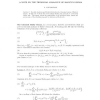Free Online Productivity Tools
i2Speak
i2Symbol
i2OCR
iTex2Img
iWeb2Print
iWeb2Shot
i2Type
iPdf2Split
iPdf2Merge
i2Bopomofo
i2Arabic
i2Style
i2Image
i2PDF
iLatex2Rtf
Sci2ools
JCT
1998
1998
A Note on the Trinomial Analogue of Bailey's Lemma
Recently, Andrews and Berkovich introduced a trinomial version of Bailey’s lemma. In this note we show that each ordinary Bailey pair gives rise to a trinomial Bailey pair. This largely widens the applicability of the trinomial Bailey lemma and proves some of the identities proposed by Andrews and Berkovich. The trinomial Bailey lemma. In a recent paper, Andrews and Berkovich (AB) proposed a trinomial analogue of Bailey’s lemma [3]. As starting point AB take the following definitions of the q-trinomial coefficients (1) L; B; q A 2 = ∞ j=0 qj(j+B) (q)L (q)j(q)j+A(q)L−2j−A and (2) Tn(L, A, q) = q L(L−n)−A(A−n) 2 L; A − n; q−1 A 2 . Here (a)∞ = ∞ n=0(1 − aqn ) and (a)n = (a)∞/(aqn )∞, n ∈ Z. To simplify equations it will also be convenient to introduce the notation (3) Qn(L, A, q) = Tn(L, A, q)/(q)L. We note that the q-trinomial coefficients are non-zero for −L ≤ A ≤ L only. A pair of sequences ˜α = {˜αL}L≥0 and ˜β = {˜βL}L≥0 is said to f...
| Added | 22 Dec 2010 |
| Updated | 22 Dec 2010 |
| Type | Journal |
| Year | 1998 |
| Where | JCT |
| Authors | S. Ole Warnaar |
Comments (0)

